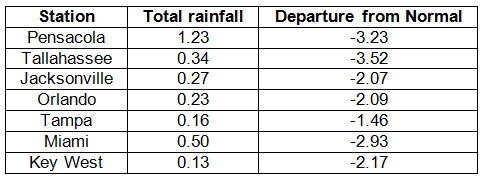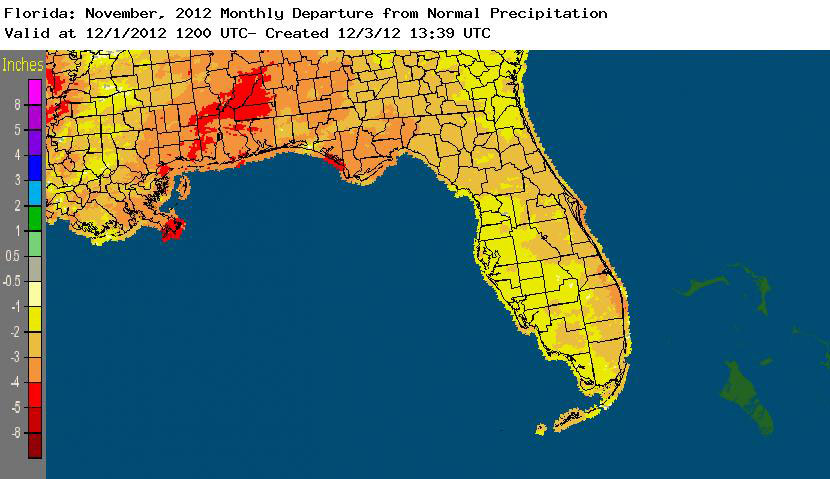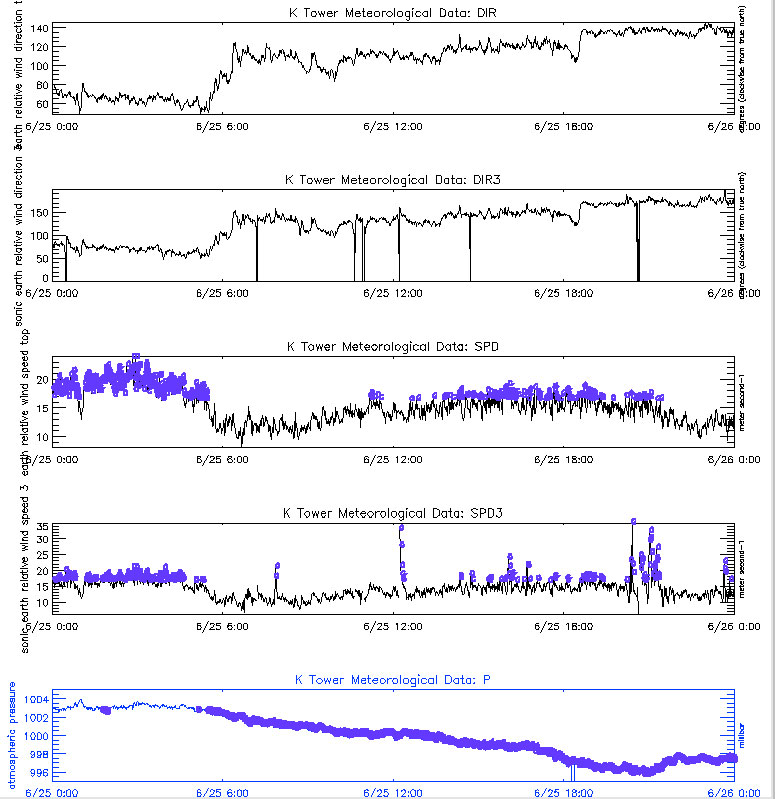|
|
|
|
Dear Florida Climate Center Friends,
We'd like to present you with the December 2012 edition of our newsletter. In this newsletter, you'll find our monthly climate summary, a list of special events that our staff attended, an example of a data request made to the office, and more. If you have any questions, please email us at climate@coaps.fsu.edu.
Thanks,
The Staff of the Florida Climate Center
 |  |  | David Zierden
State Climatologist | James O'Brien
Professor Emeritus | Melissa Griffin
Asst. State Climatologist |
|
November Climate Summary for Florida
The Florida Climate Center's November 2012 Florida Climate Summary is now available. The summary provides an analysis of temperature and precipitation trends across the state, along with data on hazardous weather, drought, the impacts of the weather and any records tied or broken for the month. During November, average temperatures and rainfall totals were below normal across Florida. El Niņo-Southern Oscillation conditions are still neutral. The Climate Prediction Center (CPC) predicts normal temperatures for the northern part of the state; below normal temperatures for the peninsula; and above normal precipitation in the western Panhandle and north Florida through February. Past summaries are archived here.
| November average temperatures and departures from normal (° F) for select cities. |  |
| November precipitation totals and departures from normal (inches) for select cities. |  |
| A graphical depiction of the monthly rainfall departure from normal (inches) for November (courtesy of NOAA, NWS). |  |
|
|
2012 Hurricane Season Review
November 30th marked the official end to the 2012 Hurricane Season. This makes the 7th consecutive year that no major hurricane made landfall in the U.S., but this year will be remembered by Isaac and Sandy. The Mid-Atlantic and the Northeast have been impacted two years in a row, with Irene in 2011 and Sandy this year. Here is a quick overview of the 2012 season:
- 19 Named Storms - 10 Hurricanes, 1 Major Hurricane
- Two storms were named in May, before the official start of the season.
- Florida was impacted by the following storms: TS Alberto, TS Beryl, TS Debby, Hurricane Isaac and Hurricane Sandy.
To find out more about the season, you can read the official press release from NOAA.
In addition, the National Hurricane Center will be putting together Tropical Cyclone Reports for all of the 2012 storms. Once they have finalized these in-depth reports on individual storms, they will be posted here.
|
|
Southeast Climate Extension Team Plans Upcoming Event
The Southeast Climate Extension Team held a two-day planning meeting in Camilla and Tifton, Georgia, on November 12-13, hosted by the University of Georgia. The team toured the Stripling Irrigation Research Park on the 12th before spending the day discussing outputs and goals for the upcoming year. Members from 5 southeastern universities, including the Florida Climate Center at FSU, provided an update on a 4-H Weather and Climate toolkit that is in development and also outlined the future creation of a factsheet handbook to address managing climate variability for agriculture in the southeast U.S.
In addition, the group also finalized plans for the Climate Adaption Exchange Program that will be held in Tifton, GA, in February 2013, which will cover drought management, reducing risk and costs, and the latest climate outlooks and information for the 2013 spring growing season.
|
|
Southeastern State Climatologists Strengthen the SECC
The Southeast Climate Consortium held its annual fall planning meeting in Tifton, Georgia, on November 13-15, hosted by the University of Georgia. The Southeast Climate Consortium (SECC) is a partnership of eight universities in the Southeast that work together and perform research to facilitate the effective use of climate information and forecasts in the management of agriculture and natural resources in the Southeast U.S. The SECC is supported by grants from NOAA and USDA in addition to many other competitive grants. The SECC is strengthened by research and data service provided by the state climate offices of Alabama, Florida, Georgia, and North Carolina.
Florida State Climatologist David Zierden was present as progress and new findings of current projects were discussed, as well as opportunities for further collaboration. Highlights from the meeting include a presentation of near-real time crop modeling across the Southeast at the University of Alabama Huntsville and climate data access tools at North Carolina State University.
|
|
Example Data Request
Each month, we highlight here recent examples of some of the many public services provided by the Florida Climate Center:
The 2012 Hurricane Season officially ended November 30th, and for the next few months, forecasters at the National Hurricane Center (NHC) will finalize in-depth Tropical Cyclone Reports of the 19 named storms that were observed this season. These reports include items such as maps of the track of each storm, along with a synoptic history and meteorological statistics, damage and casualty numbers and information, and forecast verification. A forecaster from the NHC contacted the Florida Climate Center at the end of November to find out more information about the observations taken from the Northern Gulf Institute (NGI)/Center for Ocean-Atmospheric Prediction Studies (COAPS) instruments on Tower No. N7, commonly referred to as K-Tower, out in Apalachicola Bay. With help from researcher Jeremy Rolph, the FCC was able to provide the forecaster with the minimum pressure and maximum wind speeds from Tropical Storm Debby, which passed close to the location of the tower on June 25th.  |
|
About Us
The Florida Climate Center is part of a three-tiered system of national, regional, and state climate offices, including NOAA's National Climatic Data Center and the Southeast Regional Climate Center. The Florida State Climatologist and other staff at the Florida Climate Center provide the following information and services to the people of Florida:
· Climate Data:
Historical weather observations for weather stations throughout the state of Florida. We are able to provide data for most stations from 1948-present.
· Climate Information:
Long-term historical averages for various stations, climate divisions, and the entire state.
· Extreme Event Records:
Information and analyses on extreme events such as freezes, droughts, floods and hurricanes.
· Special Analysis:
With their vast knowledge of El Niņo, La Niņa and climate variability, the State Climatologist and staff can offer expert insight into Florida's climate trends.
· Outreach:
Activities, presentations, and workshops that inform and educate the people of Florida about current and emerging climate issues. We also coordinate volunteers for the Community Collaborative Rain, Hail & Snow Network (CoCoRaHS).
More About Us
|
|
|